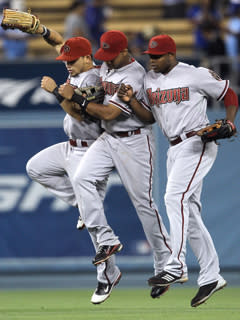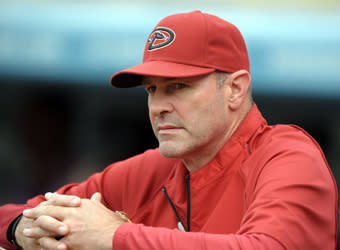Arizona displayed guts at another club crossroads
LOS ANGELES It was mid-May and the Arizona Diamondbacks were a tangle of unfulfilled talent, uncertain direction and unsold tickets.
As such, their record was 15-22, their deficit in the National League West 5½ games, their season headed exactly where spring had portended.
The lingering question was not whether manager Kirk Gibson's head would explode, but where his eyebrows might land.
Maybe, someday, the Diamondbacks and their bucket-loads of precociousness would amount to something. For the moment, however, they were being run out of the division again.
"There were two ways we could have gone," right fielder Justin Upton(notes) said.
They could continue their course toward a new and growing irrelevance, followed by the usual explanations of organizational development and promise.
"Or," Upton said, "we'd show the guts to turn this thing around."
Nine games from the end, it is the San Francisco Giants and the rest of the West who've been eviscerated, and the Diamondbacks who've played themselves to the brink of October.
Since those discouraging early weeks, Gibson's collection of no-names, strays and hardball nascence is 73-43. No team has won more games in the past four months, not the Philadelphia Phillies, not the New York Yankees, not the Detroit Tigers, not the Boston Red Sox.
Consider it a gift from unbalanced scheduling and membership in the NL West, against which the Diamondbacks are 39-27. But the Giants get the same advantage, are 40-23 in the same division and their current eight-game winning streak appears futile.
It was the Diamondbacks and not the World Series-hardened Giants who grinded through the worst of summer, through the games upon games. It was the Diamondbacks who won where they'd previously lost, Ian Kennedy(notes) who'd become an ace, Upton who'd become an MVP candidate, and a roster that had – almost to a man – found (or re-found) itself: Miguel Montero(notes) at 27, Ryan Roberts(notes) at 30, Gerardo Parra(notes) at 24, Upton at 23, Paul Goldschmidt(notes) at 23, Kennedy at 26, Daniel Hudson(notes) at 24, Josh Collmenter(notes) at 25, David Hernandez(notes) at 26, J.J. Putz(notes) at 34, even Gibson at 54.
There'd been some turnover. Not enough to explain this. The bullpen was better. And still not good enough to carry this. Gibson asked for more. So had previous managers Bob Melvin and A.J. Hinch. They couldn't by themselves push the Diamondbacks to this.
One day, they all just showed up.
After several years of trying to align arriving pitching potential with coming position-player promise, it sort of just happened. The clubhouse became a place of strength. Of trust.
On an afternoon last week, Montero was asked by a polling official to identify the league's comeback player of the year. He decided most of his teammates qualified.
"Me?" he finally asked, laughing.
And they all laughed with him.
They'd come back from 97 losses, after all, and from consecutive seasons in which they'd had managers fired, and from the frustrations of more change.
"We underperformed two years in a row," Upton said. "By the ends of those seasons, we had no hope. But you realized the guys who wanted to be here, who didn't want to be embarrassed."
So, gradually, the Diamondbacks began to win again. They'd opened a new spring facility, maybe the best in either league. They hosted the All-Star game, and actually had guys in it. They had the second-best team ERA in the league in May, and in the second half knocked more than half a run off that figure.
On Aug. 2, Hudson outpitched Tim Lincecum(notes) in San Francisco, the Giants' bullpen came apart, and the Diamondbacks climbed into a first-place tie in the West. Eight days later they moved into first for good. By the end of the month their lead was six games. Then, it was 9½.
"That was the fun part," Upton said. "We knew we had a good team here. While everyone was praising the Giants and saying we didn't have a chance, we were in the clubhouse laughing."
Generally, they cannot pitch with the NL's elite. But they will hit with them. They are an average defensive team. But they will not quit.
They lack the depth of the Phillies, the star power of the Brewers and the savvy of the Braves. But assuming they hold off the Giants in these finals days, they will belong.
For no particular reason, for a thousand reasons, they will belong.
Gibson has no time to get into any of them. A question about the similarities between this team and the overachieving '88 Dodgers very nearly caused him to wince. Attempts at probing analysis clouded over his eyes. Anything to do with yesterday, he leaves with yesterday. Tomorrow stays tomorrow, too. He won't talk just to talk, though he will growl for the sake of that.
That means the horrible Diamondbacks of 2010, of April and some of May in 2011, is of no concern to him anymore. After 153 games, they are who they are, not awful, and not yet heroic. Just playing the game and living beyond the expectations of people whose opinions didn't matter anyway.
By now, Gibson's eyebrows were going to be floating to earth somewhere near downtown Phoenix. They're still attached.
"We became good at hanging in there," he finally offered, "and at recovering from mistakes."
Well, sometimes that takes guts, too.
Other popular stories on Yahoo! Sports:
• Video: Rockies lefty is fantasy pitcher of the week
• Kobe prepared to loan players money during NBA lockout
• Longest-suffering sports city may surprise you


